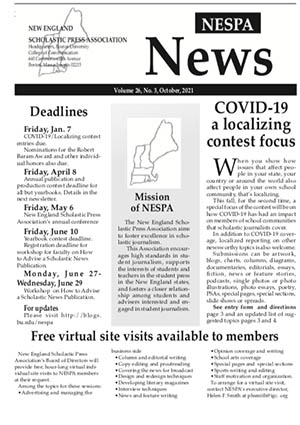Tom Fiedler, College of Communication dean, gives keynote speech
By Katie Dupere
Shrinking newspaper circulation could make a career in journalism seem like a gamble.
But with new technology revolutionizing the field and a growing demand for trustworthy news, journalism will flourish, said Tom Fiedler, dean of Boston University’s College of Communication.
“Journalism—the disciplined process of gathering, verifying and conveying news and information—is neither dead nor dying, and the numbers are here to prove it,” he said.
“When you combine the readership of any major newspaper with the audience for its website, you’ll find that more readers than ever in that newspaper’s history are consuming its journalism.”
In a packed Morse Auditorium, Fiedler talked about the future of journalism to people depending on its success—high school journalists attending the 62nd annual New England Scholastic Press Association conference Friday, April 30.
Although he focused on the positives of the growing field and emphasized the transition journalism is going through, he said that when he was invited to give the keynote speech, he thought the title should be “Is journalism a dead-end job?’”
“The world’s greatest newspaper, The New York Times, staggers under crushing debt,” he said. “Last week the newspaper circulation bureau issued its latest numbers: The Globe was down 23 percent. The New York Times was down 8 percent.
“Newspapers are in what may be a death struggle. But don’t conflate turmoil in the newspaper business with turmoil in journalism.”
One question is whether majoring in journalism is a smart thing to do, Fiedler said.
“People want the news,” he said. “They just don’t see the need to pay for it.
“Free is good for the consumer, not the journalist. You don’t lack information because you didn’t go out and buy a newspaper. That information is still out there. That’s not good for a journalist who wants to eat and wants to have a place to live.
“Does free news over the Internet mean if you are a journalist you will end up holding up cardboard signs on street corners offering to report, write, shoot or edit for food?” he continued. “Hardly.
“The good news you can tell your parents is that’s not going to happen. The job outlook for people with journalism degrees is quite bright.”
Fiedler said the U.S. Bureau of Labor Statistics estimates that the number of familiar news jobs in newspapers, broadcast newsrooms and related websites will grow by 136,000 in the next 10 years.
“If you expand the definition to include writers and editors, another 60,000 new jobs will be created,” he said. “That’s about 200,000 jobs waiting for traditional journalists above and beyond those jobs that exist today.”
More important, Fiedler said, the web is opening a “vast and ever-expanding universe of opportunities.”
“When you were born, the Internet barely existed,” he said. “There was no Google; no newspaper was on the web.
“The first newspaper site was not created until 1995. In your lifetime, this tool has emerged and is now part of your everyday life.”
“Consider this: As of May there were some 110 million websites carrying more than 25 billion pages. If we count only English-language dot-coms, you’d still have roughly 50 million websites.”
In today’s businesses, journalists are not only writing articles, but also helping to upload content on the websites of the publications and corporations they work for, Fiedler said.
“If you ask yourself who runs the websites and who puts up the information, the answer is people who have journalism skills,” Fiedler said.
“Every major corporation in the country has a website of some kind. That website needs to have information that is comparable and needs to be updated. The people doing this have journalism degrees.”
High school journalists are already among the élite in terms of marketable skills, Fiedler said.
“The skills you learn today already separate you from your peers,” he said, citing “the ability to test what you hear.”
When journalists gather information and apply it to that type of context, they can reach an audience with the information they have, he said.
“These are skills that will aid you anywhere that you go,” he said.
“The final and most important part is that journalism matters.
“Being a journalist matters. I believe you have the ability to tell stories people don’t want told.
“You have the ability to make a change. The stories that you tell have the ability to change things in your school. You can change a community, change a school, change a country, change the world.”
Katie Dupere is an editor of The Villager at Westport High School in Westport, Mass.

